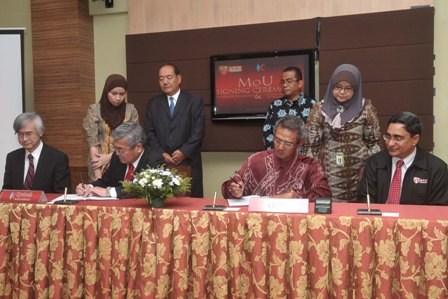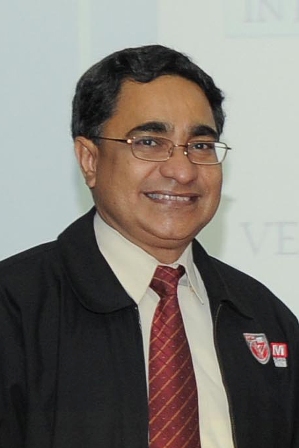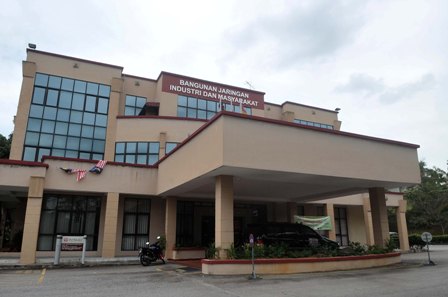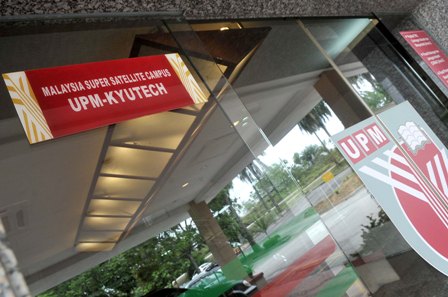By Kuah Guan Oo
Pic by Marina Ismail

SERDANG, 24 Sept (UPM) - From a simple research collaboration on palm oil waste almost 20 years ago, the Kyushu Institute of Technology (Kyutech) of Japan and Universiti Putra Malaysia (UPM) are to hold a symposium where they will set new milestones in their close partnership with the official opening of Kyutech’s satellite campus in Serdang.
The Malaysia Super Satellite Campus (MSSM) in UPM is the first Japanese campus in Malaysia and Southeast Asia that offers twin Kyutech-UPM degree programmes, while the symposium on “Towards Strengthening Malaysia-Japan Research Collaboration” from 30th Sept to 1st Oct 2013, will be the first of a series to provide a unique platform for researchers, students and engineers to share their experiences and views.
Prof Dr Mohd Ali Hassan, the Dean of the Biotechnology and Biomolecular Sciences Faculty, was UPM’s key player when Kyutech first came for the research collaboration in Felda Serting Hilir in 1994, to reduce greenhouse gases (GHG) from palm oil mills and to utilise palm biomass.

That humble beginning in Serting Hilir in Negeri Sembilan, said Prof Ali, has spawned a string of achievements that included a fully operational biogas pilot plant, a compost pilot plant in UPM, a bioplastic pilot plant in SIRIM, an Oil Palm Biomass Consortium under the National Biomass Strategy, the Serdang Biomass Town Biorefinery in UPM.
Apart from more than RM10 million research grants received, the research collaboration saw 15 PhD students getting their scrolls, while another 10 are currently under the Kyutech-UPM joint supervision.
Also produced were 60 refereed papers with joint authors, while Scival Spotlight noted that Kyutech is UPM’s top collaborator.
Their research work had also yielded 8 joint patents, 10 industry partners from Malaysia and Japan, 5 Gold medals, three pilot plants and one commercialised plant by Felda Palm Industries Sdn. Bhd.

All in all, UPM’s students and academic staff made a total of 50 visits to Kyutech, situated in Fukuoka province on the northern tip of Kyushu island. In return, there were 150 visits from Kyutech to UPM.
Prof Ali said the importance of the research collaboration with Kyutech on palm oil biomass can be seen in the fact that there are over five million hectares of oil palm plantations in Malaysia, generating 90 million tonnes of renewable biomass a year.
Palm oil is also a major revenue earner for the country that it is sometimes described as Malaysia’s liquid gold, where Felda, a key player , is keen to create new green industry utilising the palm biomass.
This close collaboration had led to the opening of Kyutech satellite office in UPM in August 2004, before the two universities signed their Memorandum of Understanding (MoU) to set up MSSM on 8th March 2013.
The pact was signed by Kyutech president Dr Morio Matsunaga and UPM Vice Chancellor Prof Datuk Dr Mohd Fauzi Ramlan. It was witnessed by the Japanese Ambassador to Malaysia, Mr Shigeru Nakamura, and the Minister of Higher Education then, Dato’Seri Mohamed Khaled Nordin.

Prof Ali had said then that priority would be given to students going for engineering, computer science, medicine and biotechnology, and they would have to study in the two universities at different time.
After Serting Hilir in Negeri Sembilan, UPM’s cooperation with Kyutech shifted to Sandakan and the Sungai Kinabatangan area in 2002 where they collaborated to develop a zero-discharge system for the oil palm mills.
The green concept project in Sandakan was to have a better and safer oil palm waste disposal system without toxins, while ensuring quality air that is free from pollution. The four-phase project covered biogas for power, biodiesel for fuel, and biocompost for fertilizer.
Kyutech, in its web site, said their collaboration with UPM and the National Institute of Advanced Industrial Science and Technology (AIST) at the Biomass Research Centre at UPM is to develop the latest advanced technologies to create renewable energy and value added products from biomass resources in Malaysia, including palm biomass.
They also aimed to foster human resources who can contribute to solve any global warming issues in the Asian region. – UPM
- kgo/
Date of Input: |
Updated: | amir_peli
MEDIA SHARING






























